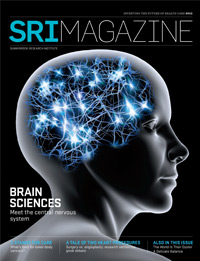News
Landmark Gift Establishes Unique Brain Research Centre
The Slaight Family Foundation will invest $10 million to establish the Slaight Centre for Image-Guided Brain Therapy and Repair at Sunnybrook Research Institute (SRI).
The centre will be the site of the world’s first clinical trials evaluating the use of focused ultrasound to deliver therapy through the blood-brain barrier to treat brain disorders, including dementia and stroke.
At its core will be a fully integrated positron emission tomography-magnetic resonance imaging scanner. It will be modified to incorporate transcranial focused ultrasound technology developed by SRI’s Dr. Kullervo Hynynen, in collaboration with industry. The resultant system will be unique.
With Hynynen, the lead scientists for this centre are Drs. Isabelle Aubert, Sandra Black and Curtis Caldwell. The system will enable them to advance promising preclinical research into patient studies. The aim is to deliver therapies safely into the brain to treat disease and, ideally, to repair damage and restore function.
The investment is part of a $50-million gift from the Slaight Family Foundation to five health sciences centres in Toronto.
Hottest Science Undergrad Prize in the Country
The Sunnybrook Prize is attracting dozens of undergraduate students eager to showcase their projects in biomedical research at Sunnybrook Research Institute's (SRI) annual competition.
The national award comes with $10,000 cash. It was established in 2011 by faculty within SRI’s Physical Sciences platform using royalties generated by their technology development. They wanted to acknowledge students for their hard work and contributions to research, and promote careers in biomedical science.
Ben Ouyang, a fourth-year biomedical engineering student at the University of Toronto, won the 2013 Sunnybrook Prize. His outstanding project focused on tissue engineering and developing an elastic, biodegradable material that has the unique ability to be tunable to mechanical properties.
The competition is open to undergraduates in the physical sciences and engineering disciplines who are in their final two years of study at a Canadian university. For more on the Sunnybrook Prize, visit sunnybrook.ca/research.
Joining Forces on Next-Stage Radiation Therapy
Elekta and Philips Healthcare have partnered with Sunnybrook Research Institute to test a new magnetic resonance imaging (MRI)-guided radiation therapy system.
The system integrates an advanced 1.5 Tesla MRI machine with radiation therapy. The technology was designed to enable physicians to deliver radiation in real time under MR guidance for more precise cancer treatments. Physicists, engineers and clinicians will work together to validate the advantages of MR-guided radiation therapy through technology development and clinical trials.
“We have identified several areas to study the value of this technology for patients,” says Dr. Michael Julius, vice-president of research at Sunnybrook. “The ultimate goal—acquiring high-resolution MR images of pathology in real time as the radiation is being delivered—could have a dramatic impact on patient outcomes.”
The consortium also includes the University Medical Center Utrecht, the University of Texas MD Anderson Cancer Center and The Netherlands Cancer Institute-Antoni van Leeuwenhoek Hospital.







